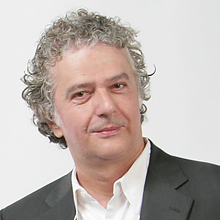Yiannis Aloimonos

Yiannis Aloimonos is a professor of computer science with an appointment in the University of Maryland Institute for Advanced Computer Studies.
Recognized for his research and scholarship in computer vision, much of Aloimonos’ recent work is devoted to the principles governing the design and analysis of real-time systems that possess perceptual capabilities. Such capabilities have to do with the ability of the system to control its motion and the motion of its parts using visual input (navigation and manipulation), and the ability of the system to break up its environment into a set of categories relevant to its tasks and recognize these categories (categorization and recognition).
Go here to view Aloimonos's academic publications on Google Scholar.
Publications
1990
1990. Catastrophe theory and computational vision. Proc. AAAI-90 Workshop on Qualitative Vision. :96-100.
1990. Purposive and qualitative active vision. Proceedings of 10th International Conference on Pattern Recognition, 1990. i:346-360vol.1-346-360vol.1.
1989
1989. Unifying Shading and Texture Through an Active Observer. Proceedings of the Royal Society of London. B. Biological Sciences. 238(1290):25-37.
1989. Optimal motion estimation. Workshop on Visual Motion, 1989.,Proceedings. :229-237.
1989. Learning early-vision computations. JOSA A. 6(6):908-919.
1989. Unification and integration of visual modules. Proceedings Image Understanding Workshop. :507-551.
1989. On the kinetic depth effect. Biological cybernetics. 60(6):445-455.
1988
1988. Active vision. International Journal of Computer Vision. 1(4):333-356.
1988. Shape from patterns: Regularization. International journal of computer vision. 2(2):171-187.
1988. The Maryland approach to image understanding. Science Applications International Corp, Proceedings: Image Understanding Workshop,. 1
1988. Robust computation of intrinsic images from multiple cues. Advances in Computer Vision. 1:115-163.
1988. Visual shape computation. Proceedings of the IEEE. 76(8):899-916.
1988. Shape from texture. Biological Cybernetics. 58(5):345-360.
1988. Optimal Computing Of Structure From Motion Using Point Correspondences In Two Frames. Proceedings of Second International Conference on Computer Vision. :449-453.
1988. Using flow field divergence for obstacle avoidance in visual navigation. Science Applications International Corp, Proceedings: Image Understanding Workshop,. 2
1987
1987. Learning shape computations. Proc. DARPA Image.
1987. Spatiotemporal blur paths for image flow estimation (A). Journal of the Optical Society of America A. 4:35-35.
1987. Determining three dimensional transformation parameters from images: Theory. 1987 IEEE International Conference on Robotics and Automation. Proceedings. 4:57-61.
1986
1986. Shape and 3-d motion from contour without point to point correspondences: General principles. CVPR86. :518-527.
1986. Computing Intrinsic Images..
1985
1985. Contour, orientation and motion. Proceedings: Image Understanding Workshop (Miami Beach, FL, December 9–10, 1985). :129-136.
1984
1984. Direct processing of curvilinear sensor motion from a sequence of perspective images. Proc. Workshop on Computer Vision: Representation and Control. 72:77-77.
1984. The relationship between optical flow and surface orientation. Proc. of the 7-th ICPR, Montreal-Canada.
1980
1980. Correspondence from Correspondence. Optical Society of America, Topical Meeting on Machine Vision. :46-51.
Pages
- « first
- ‹ previous
- 1
- 2
- 3
